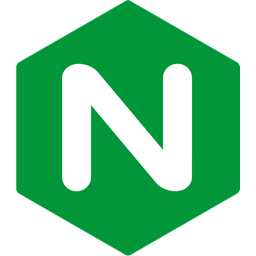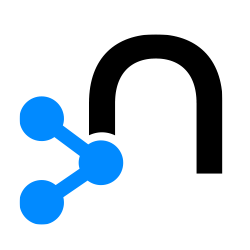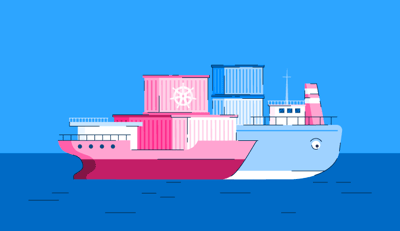December 20, 2017
 by Aaron Walker / December 20, 2017
by Aaron Walker / December 20, 2017

Docker, a noted container platform, has become enormously popular over the last few years, but to really capitalize on it, you need to integrate third-party images.
Public repositories give you access to configured images to add functionality, integrate data, add storage and reduce development time. Docker Hub, Docker’s public registry, can be your central source for container apps, images and repositories to improve your product. The public registry contains 100,000-plus public apps, images and repositories for users to access.
What are containers? They’re efficient little environments used to store data and run applications. They’re secure and resource-independent, so it’s often easy for companies to add a container to the stack to add features. It’s typically done through continuous integration, but there are a lot of ways containers can benefit DevOps teams and microservice providers.

We’ve ranked the tools listed on G2 Crowd and available in Docker Hub as official repositories. The majority of images stored there are from community members, but official repositories are certified by Docker, have clear documentation and are designed for common use cases.
Stars are essentially upvotes that serve as a representation of popularity and satisfaction by the community and as a bookmark for users, according to Docker. Pulls are the total number of times a specific image was pulled from each individual registry.
| Product | Docker Hub Pulls | Docker Hub Stars | G2 Crowd Star Rating | Satisfaction Score | Market Presence |
|---|---|---|---|---|---|
| Wordpress | 10,000,000 | 4169 | 4.3 | 99 | 80 |
| Ubuntu | 10,000,000 | 233 | 4.5 | 94 | 50 |
| MySQL | 10,000,000 | 225 | 4.4 | 93 | 75 |
| MongoDB | 10,000,000 | 168 | 4.4 | 90 | 52 |
| Mariadb | 10,000,000 | 37 | 4.6 | 90 | 34 |
| Arangodb | 1,000,000 | 22 | 4.9 | 90 | 23 |
| Ruby on Rails | 1,000,000 | 52 | 4.5 | 84 | 30 |
| PostgreSQL | 10,000,000 | 128 | 4.4 | 82 | 36 |
| Django | 1,000,000 | 59 | 4.6 | 79 | 25 |
| Redis | 10,000,000 | 70 | 4.4 | 76 | 32 |
| Memcached | 10,000,000 | 11 | 4.6 | 76 | 18 |
| Centos | 10,000,000 | 68 | 4.5 | 75 | 32 |
| Fedora | 10,000,000 | 44 | 4.5 | 72 | 54 |
| Nginx | 10,000,000 | 31 | 4.8 | 72 | 36 |
| RethinkDB | 5,000,000 | 13 | 4.4 | 67 | 20 |
| SonarQube | 5,000,000 | 10 | 4.6 | 66 | 24 |
| Sentry | 5,000,000 | 29 | 4.3 | 62 | 26 |
| Jenkins | 10,000,000 | 161 | 4.2 | 52 | 31 |
| Owncloud | 10,000,000 | 58 | 4 | 50 | 30 |
| Tomcat | 10,000,000 | 21 | 4.4 | 49 | 35 |
| Joomla | 1,000,000 | 111 | 3.9 | 48 | 28 |
| Apache Server | 10,000,000 | 23 | 4.4 | 48 | 45 |
| Neo4J | 5,000,000 | 30 | 4.4 | 46 | 32 |
| Elasticsearch | 10,000,000 | 28 | 4.6 | 44 | 32 |
| Apache Maven | 10,000,000 | 87 | 4.1 | 42 | 36 |
The following rankings are not based on Docker Hub integration or popularity in the Docker community. Rather, they are ranked by an overall satisfaction score based on user reviews for a variety of use cases.
 1. Wordpress
1. Wordpress
G2 Crowd Star Rating: 4.3/5
Satisfaction: 99
Categories: Web Content Management
Wordpress is one of the most widely used content management platforms on the web today. At the beginning of 2017, Wordpress reported it powers nearly 75 million websites used by more than 409 million people.
Using it in a Docker allows you to virtualize changes and updates made to your code without affecting the actual site. You can build web apps, import databases and make virtually any alteration you want. If you’re considering it, here is a blog explaining how to go about it.
Wordpress is the 20th-most popular repository in Docker Hub, but it’s one of the most-reviewed tools on G2 Crowd. It is currently the highest-rated product in our web content management software category.
It has reviews from 3,000 small-business users and hundreds more from mid-market and enterprise users. Some of its highest-rated features are its content authoring capabilities, its user community and its access management tools.
 2. Ubuntu
2. Ubuntu
G2 Crowd Star Rating: 4.5/5
Satisfaction: 94
Categories: Operating System
Ubuntu is one of the most-popular Linux distributions available today. 38.6 percent of Linux users run Ubuntu, according to a W3Techs survey. The Linux Counter Project estimates there are 93,820,013 users (as of Dec. 7, 2017).
Docker for Ubuntu can simplify provisioning and increase development speed for containerized applications for both virtual environments and bare metal servers. Ubuntu’s site says containers running Ubuntu have enhanced security, faster updates and simpler roll backs.
“It's also incredibly good as a server OS, especially if you are running Docker. We use it for software development as most of the tools I use are native to Linux. Ubuntu allows me to use them without having to tweak stuff at the system level.” — Ubuntu review
It’s the sixth-most popular repository on Docker Hub and the third-highest rated Linux-based operating system on G2 Crowd behind Android and Red Hat’s Enterprise Linux offering. All Docker and Ubuntu reviewers mentioning they used both gave the reviewed tool 4 or 5 stars.
 3. MySQL
3. MySQL
G2 Crowd Star Rating: 4.3/5
Satisfaction: 93
Categories: Relational Databases
MySQL is a widely used, open-source relational database that’s been around for more than 20 years. It’s currently listed as the second-most popular database on DB-Engines.
Traditionally, MySQL is installed on a host and connected through some kind of listening port. With Docker, applications can access MySQL instantly as long as Docker’s engine is installed.
That provides a compact, portable storage unit for your database. You can segment datasets, add additional information or limit the container to only data relevant to the application.
“You can easily start up new services and create your own configuration which you can set up to be the same as the live environment. It supports multiple containers at once and are easy to connect. I use it in different projects in combinations such as PHP, MySQL and Apache but also a combination of NGINX, Node, PHP and MySQL.” — Docker review
Five of Docker’s reviews mention integrating MySQL. All of those reviewers gave Docker a 4- or 5-star rating. Some of its highest-rated features include its query language, availability and storage capabilities.
MySQL is the seventh-most popular repository in Docker Hub and the highest-rated product in G2 Crowd’s relational database category. It was also named the best free relational database in a recent G2 Crowd blog.
 4. MongoDB
4. MongoDB
G2 Crowd Star Rating: 4.4/5
Satisfaction: 90
Categories: Document Databases
MongoDB is another open-source database, but unlike MySQL, MongoDB is a document database. Document databases don’t utilize traditional SQL organization and provide increased flexibility regarding the types of information stored.
Docker users would benefit from the same storage and security benefits provided through any containerized database. But MongoDB would provide a flexible and dynamic database solution, ideal for web and anyone managing tons of data that’s constantly changing.
“I use it mostly to deploy my applications with Nginx, Node.js, MongoDB, Redis and ElasticSearch. It's very easy to configure simple images and I can make sure my applications are working in the right environment and it'd be easy to throw the environments away and set them up again if needed.” — Docker review
Three Docker users mentioned MongoDB and gave Docker a 4- or 5-star rating. Some of its highest-rated features include its availability, scalability and storage capabilities.
MongoDB is the ninth-most-popular repository in Docker Hub and the highest-rated product in G2 Crowd’s document database category. It was also named the best free document database in a recent G2 Crowd blog.
 5. MariaDB
5. MariaDB
G2 Crowd Star Rating: 4.6/5
Satisfaction: 90
Categories: Relational Databases
MariaDB is a relational database tool like MySQL, but a bit less popular. An article on MariaDB’s site compares the two, but for the most part, they provide similar functionality.
The benefits for a Docker user would be similar to those of MySQL. Choosing between relational databases really depends on your existing database and experience with each product’s storage practices.
DB-Engines has MariaDB ranked as the 18th-most popular database and the 10th-most popular relational database. MariaDb was rated a High Performer in G2 Crowd’s Summer 2016 Relational Databases Grid®.
It’s the 21st-most popular repository in Docker Hub and has the sixth-highest satisfaction scores among relational databases on G2 Crowd. Some of its highest-rated features include its availability, scalability and storage capabilities.
 6. ArangoDB
6. ArangoDB
G2 Crowd Star Rating: 4.9/5
Satisfaction: 90
Categories: Key-Value Stores, Document Databases & Graph Databases
ArangoDB is a popular open-source graph database. It’s only six years old and the 68th-highest rated database on DB-Engines, but the sixth-highest rated graph database.
Implementing a graph database through Docker obviously has storage benefits. But it also allows users a more flexible data modeling, an application server and a simplified, mobile-friendly cluster. More information about running ArangoDB in containers is available here.
It’s not one of the 50 most common repositories on Docker Hub, but it is the second-highest rated graph database on G2 Crowd. It was also named the second-best free graph database in the same G2 Crowd blog mentioned above. Some of its highest-rated features are data manipulation, query language and availability.
 7. Ruby On Rails
7. Ruby On Rails
G2 Crowd Star Rating: 4.5/5
Satisfaction: 84
Categories: Other Web Frameworks
Ruby on Rails is a Ruby-based web application framework. It’s been around for more than a decade, but there are mixed opinions on using the framework in the future.
It won TIOBE’s “language of the year” award in 2006, but has been declining in popularity since 2008. As of Nov. 12, TIOBE shows its usage at the same rate as mid-2006. They currently list Ruby as the 13th-most popular programming language.
Using Docker as a development environment allows teams to share files easily, mirror your production environment and access continuous delivery tools. This can simplify development and code sharing while making it easier to deploy your application with the assurance its production environment won’t make a difference.
It’s around the same place as ArangoDB in terms of Docker popularity, but it has the second-most reviews of a web framework on G2 Crowd, behind Django, a popular web framework.
 8. PostgreSQL
8. PostgreSQL
G2 Crowd Star Rating: 4.4/5
Satisfaction: 82
Categories: Relational Databases
PostgreSQL is another relational database tool with similar functionality to MySQL and MariaDB. It’s the fourth-most-popular overall database and the fourth-most popular relational database, according to DB-Engines.
Docker users will, again, get similar functionality to other database tools. Still, some of the product’s highest-rated general features are stability, availability and query language.
“You can start using it with the official docker image in just a few seconds. If you're looking for a SQL DBMS, just fire up a docker container with PostgreSQL and start using it in your next project.” PostgreSQL review
It had the highest satisfaction score in G2 Crowd's Summer 2016 Grid® for Relational Databases, but its low market presence kept it as a High Performer. We named PostgreSQL the second-best free graph database in the same G2 Crowd blog.
 9. Django
9. Django
G2 Crowd Star Rating: 4.6/5
Satisfaction: 79
Categories: Python Web Frameworks
Django is a web framework, much like Rails, but it’s used for Python application development. It’s the sixth-most popular web framework, according to HotFrameworks.
Docker users can simplify application management by providing an abstraction layer to run on whatever server you choose. Development teams can benefit from simplified sharing and configuration management practices.
Its popularity on Docker isn’t super high, but it has a lot of stars relative to its pull count. It’s the most-popular web framework on G2 Crowd and powers popular sites like Google, Youtube and Quora.
 10. Redis
10. Redis
G2 Crowd Star Rating: 4.4/5
Satisfaction: 76
Categories: Graph Databases, Document Databases & Key-Value Stores
Redis is a popular open-source key-value store. It’s the most-popular key-value store and the eighth-most popular overall database, according to DB-Engines.
As a key-value store, Redis would give Docker users the ability to interpret abstract data structures. Complex data that isn’t well-suited for traditional relational databases can benefit from Redis by assigning meaning to difficult-to-interpret data.
“You can quickly setup and system by spinning up the various images, without lengthy installation or setup. For example, you can quickly get a nginx, redis, hapi server, and mongodb up and running in a matter of minutes.” — Docker review
It’s the most-popular and highest-rated product in G2 Crowd’s key-value store category. It was rated as a Leader in the Winter 2016 G2 Crowd Grid® for Key-Value Stores. And some of its highest-rated features are its availability, stability and storage capabilities.
 11. Memcached
11. Memcached
G2 Crowd Star Rating: 4.6/5
Satisfaction: 76
Categories: Key-Value Stores
Memcached is also a key-value store and would provide Docker users the same benefits as Redis. DB-Engines ranks Memcached the second-highest rated key-value store, but there’s a decent gap as it’s the 24th-highest rated overall.
Some other benefits of key-value stores are increased site speed as a result of better data distribution and limit the need to access external data stores. They can be used to improve performance on MySQL and Oracle databases.
It has the fourth-highest satisfaction scores of key-value stores on G2 Crowd. Its highest-rated general features are its scalability, stability and availability.
 12. CentOS
12. CentOS
G2 Crowd Star Rating: 4.5/5
Satisfaction: 75
Categories: Operating System
CentOS is a Linux-based operating system, much like Ubuntu. It was the third-most popular Linux distribution on W3Techs and the 14th-most popular repository on Docker Hub.
Running CentOS on Docker can save users time in development, simplify provisioning and accelerate deployment time. The main difference between CentOS and Ubuntu is the fact CentOS is based on Red Hat Linux and Ubuntu is based on Debian.
“CentOS is an extremely mature and stable platform for system administrators to use. There are easy-to-download ISOs which don't change rapidly, and are a direct evolution of RHEL, the most widely-used Linux Platform. CentOS posts Docker and AWS Images for ease of use in a virtual environment, and the entire system is designed for rapid secure deployment.” — CentOS review
It’s the fifth-highest rated Linux operating system on G2 Crowd and has the fourth-highest satisfaction score of Linux distributions. The tool has only one review lower than a 4-star rating and is evenly distributed across company sizes.
 13. Fedora
13. Fedora
G2 Crowd Star Rating: 4.5/5
Satisfaction: 72
Categories: Operating System
Fedora is also a Linux-based operating system which, like CentOS, is a part of the Red Hat Linux family. W3Techs rates Fedora as the sixth-most popular Linux distribution, but that’s only 0.8 percent of Linux users.
It comes with built-in functions for Docker, Flannel and Kubernetes, so most container platforms and orchestration tools will be easy to configure. It’s available with a monthly Edge or quarterly Stable release.
“It comes with almost all the tools a software developer needs, the ones that you need are a click away. I also like the fact that it has built in docker support and comes with a set of virtualization tools. The UI is sleek looking and you get used to it fast.” — Fedora review
Its G2 Score is slightly higher than CentOS, but Fedora has slightly lower satisfaction. The tool has only one review lower than a 4-star rating and is used mostly by small- and medium-sized businesses.
 14. Nginx
14. Nginx
G2 Crowd Star Rating: 4.8/5
Satisfaction: 72
Categories: Application Server, Web Server Accelerator & Container Networking
Nginx is an open-source HTTP server and reverse proxy tool that can be used to optimize container networking processes. It has the most stars and is the most popular repository in Docker Hub.
The server can support multiple backend applications, consolidate logging and provide a single entry point for administrators or developers. Its site boasts zero downtime because of its high availability. More of its containerization benefits are detailed on the company’s blog.
"The configuration language is simple and very close to the syntax used by Apache HTTPd server. It supports multiple backends to proxy applications (or micro services) built with any programming language.I personally use it even for LAN file sharing, launching a docker container as needed.” — Nginx review
Of its 31 reviews on G2 Crowd, it has 28 5-star ratings. More than half of the reviews came from small-business users, and its most commonly cited benefits are its speed and ease of setup.
 15. RethinkDB
15. RethinkDB
G2 Crowd Star Rating: 4.4/5
Satisfaction: 67
Categories: Document Databases
Rethinkdb is a document database similar to MongoDB. It just barely rounds out the top 50 of Docker Hub’s most-popular repositories. It’s the ninth-most common document database and the 55th-most common overall on DB-Engines.
Docker users could benefit from the tool’s ability to push updated query results in real time, simplifying components of the deployment process and keeping data up to date. The tool also has container networking features to share data across containers.
It’s the eighth-most common document database on G2 Crowd, but has the fourth-highest satisfaction score in the category. Only one of its 10 reviewers gave the product less than a 4-star rating.
 16. SonarQube
16. SonarQube
G2 Crowd Star Rating: 4.6/5
Satisfaction: 66
Categories: Static Code Analysis
SonarQube is an open-source static code analysis tool that can continuously inspect code within containers. The tool is used to ensure code quality and identify security risks within the source code of an application.
Docker users can obviously benefit from ensuring code quality, but it also simplifies aspects of the continuous integration process. Continuous integration tools can work alongside SonarQube to trigger analysis and identify bugs in the code.
It just missed the top-50 most-popular products on Docker Hub, but still has 600-plus stars. It’s the fourth-highest rated tool in our static code analysis category and all of its ratings are 4 or 5 stars.
 17. Sentry
17. Sentry
G2 Crowd Star Rating: 4.3/5
Satisfaction: 62
Categories: Bug Tracking & Mobile Crash Reporting
Sentry is a bug-tracking and mobile crash-reporting tool that could provide similar benefits to SonarQube. It can track bugs during the development process, when applications fail or as code is being pushed.
Docker users can use Sentry to monitor real-time activity to aggregate logs, regardless of platform. Ensuring your containerized application’s availability can be very important during rapid DevOps processes where you may push code when it’s not quite ready.
“I like the reproducibility for developers. Got a bug in production? Simply take a copy of the container running in production, load it on your desktop, open up a few ports, and start debugging.” — Docker review
It’s one of the 50 most-popular repositories on Docker Hub and the fourth-most popular product in our mobile crash reporting category. About two-thirds of its reviews are in crash reporting, but eight are in bug tracking.
 18. Jenkins
18. Jenkins
G2 Crowd Star Rating: 4.2/5
Satisfaction: 52
Categories: Continuous Integration, Continuous Deployment & Build Automation
Jenkins is an open-source continuous delivery tool for integration, deployment and build automation. Earlier this year, Stackify rated it the Top Continuous Integration Tool for 2017.
Docker is one of the most common uses for Jenkins and continuous delivery. It can help automate a whole lot of deployment and build processes to help agile teams quickly develop and push code to new and existing applications.
“Jenkins is easy to use with great support and easily can be configured via the simple UI interface. We use it for continuous deployment flows with nightly builds, instant build status feedback and for auto deployment to Docker AWS instances.” — Jenkins review
It's a top-30 Docker hub tool but has the third-most stars of any tool in the public registry. It also has the most reviews in all three of the continuous delivery categories on G2 Crowd, and ranks as a Leader in each.
 19. Owncloud
19. Owncloud
G2 Crowd Star Rating: 4.0/5
Satisfaction: 50
Categories: Business Content Management & File Storage and Sharing
Owncloud is an open-source cloud storage tool. It provides similar functionality to tools like box and Google Drive, but it must be installed on a private server or through a managed-hosting provider.
Docker users can help store content and data to optimize resources while developing with Docker. Its site claims containerized ownCloud apps can be configured, installed and production-ready within minutes [
“If you're looking to host your own alternative to Google Drive, Microsoft OneDrive etc. you can't go too far wrong with OwnCloud. This is the most complete alternative in a box that I've found so far.” — ownCloud review
It lives in our business content management category so it often gets overshadowed by tools like box and Google Drive. It only has 32 reviews, while Google Drive has more than 1,000. But if you’re looking to host your own cloud storage system, you should consider it.
 20. Apache Tomcat
20. Apache Tomcat
G2 Crowd Star Rating: 4.4/5
Satisfaction: 49
Categories: Application Server
Tomcat is an open-source application server developed and maintained by The Apache Software Foundation. It’s used to host nearly two-thirds of all java applications this year, according to Plumbr.io.
Docker users can utilize Tomcat as its application server for java-based applications. They can configure and host it themselves and easily run applications locally for testing and personal use or publicly for general use.
“I started using Tomcat server 5.0 as a web container to deploy our Java based web application, I found it very easy to learn and suitable to support mid size application. Its default configuration is good enough to support small or mid size application.” — Apache Tomcat review
It’s nearly a top-30 repository in Docker Hub and it’s the second-highest rated product in our application server category, behind Oracle WebLogic. Of its 21 reviews, only one is less than a 4-star rating.
 21. Joomla
21. Joomla
G2 Crowd Star Rating: 3.9/5
Satisfaction: 48
Categories: Web Content Management
Joomla is a free and open-source web content management system, much like Wordpress. While Wordpress is by far No. 1, Joomla is second. But it’s only the 19th-most popular system among top 10,000 websites.
Local host testing is likely the most common usage among web developers using Joomla and Docker together. A containerized Joomla file can be used to test and run changes without affecting the public site. You can still connect to databases and other external content, which will mimic the live site nicely.
It was rated as a High Performer in G2 Crowd’s Fall 2017 Grid® for Web Content Management and placed eighth on the Summer 2017 Usability Index for Web Content Management. It just missed Docker Hub’s top 50, but has 161 stars and more than one million pulls.
 22. Apache Server
22. Apache Server
G2 Crowd Star Rating: 4.4/5
Satisfaction: 48
Categories: Application Server
Apache Server is the most-popular web server and has been for more than two decades. Roughly 45 percent of active sites use Apache HTTP, according to a study conducted by Netcraft in September.
It’s the third-most common repository on Docker Hub and is typically used to build containerized applications that run httpd. It’s a reliable web server option with a rich community, but it may not have the performance capabilities of newer tools like NGINX.
“I recommend analyzing your setup thoroughly. Try to start out with a single, easy case, such as the application server or apache. Read through other Dockerfiles to get an idea of how to organize your own; the devil is in the detail. There are many ways to structure a Dockerfile and doing it right will have a large impact on your container build times.” — Docker review
Apache Server is the third-highest rated product in our application server category, right behind its cousin Tomcat. While Tomcat is geared toward Java web applications, Apache Server can be used for a much broader range of web development practices.
 23. Neo4j
23. Neo4j
G2 Crowd Star Rating: 4.4/5
Satisfaction: 46
Categories: Graph Databases
Neo4j is a popular and open-source graph database tool, like ArangoDB, but it’s more popular, according to DB-Engines. It’s rated as the No. 1 graph database and the 21st overall database.
It will provide many of the same simplified database hosting benefits of ArangoDB, but it may have some more documentation since it’s been around twice as long. It doesn’t, however, have some of the document storage and key-value storage capabilities ArangoDB does.
Implementation language support is different, too. Neo4j supports Java and Scala, while ArangoDB supports C, C++ and JavaScript. Neo4j also supports Solaris operating systems, while ArangoDB does not.
It has the highest market presence and G2 Crowd score in our graph databases category, but not the highest satisfaction. Of its 30 reviews, 28 of them are 4-star ratings or higher. It is the second-highest rated graph database on G2 Crowd. It’s also the highest-rated graph database on G2 Crowd.
 24. Elasticsearch
24. Elasticsearch
G2 Crowd Star Rating: 4.6/5
Satisfaction: 44
Categories: Other Non-Relational Databases
Elasticsearch is a search engine and database tool commonly used as a NoSQL datastore. Large companies like GitHub, Facebook and Adobe use it to power their datastores. Despite its strange model, it’s the 10th-highest rated tool on DB-Engines.
Docker developers can integrate Elasticsearch into their applications to add search components for exploration and simplified navigation. Users can also analyze any data set by using Elasticsearch to find and aggregate desired information.
“I use it mostly to deploy my applications with Nginx, Node.js, MongoDB, Redis and ElasticSearch. It's very easy to configure simple images and I can make sure my applications are working in the right environment and it'd be easy to throw the environments away and set them up again if needed.” — Docker review
It’s the 15th-most popular repository on Docker Hub and the highest-rated product in our other NoSQL category for products that don’t fit into traditional labels like document and graph databases.
 25. Apache Maven
25. Apache Maven
G2 Crowd Star Rating: 4.1/5
Satisfaction: 42
Categories: Configuration Management & Build Automation
Apache Maven is an open-source project management tool for build automation and configuration management practices. It’s the third-highest rated product in our build automation category and the second-highest in our configuration management category.
Docker DevOps teams would use Maven to keep track of scheduled builds and keep historical records of deployments, builds and configuration changes. Keeping historical records of changes made to your application can help track bugs and scale back updates if they cause failures.
“Maven is optimized for Java projects and specifically web projects that deploy to a servlet container. However, you can extend the usage to other types of projects with the use of plugins.” — Apache Maven Review
It’s a top-40 product on Docker Hub and has more than 10 million pulls. On G2 Crowd, Maven has 88 reviews, only 14 of which are less than 4-star ratings. Its reviews are also fairly evenly distributed across company sizes.
Container tools are quickly catching up to traditional virtualization solutions because of their flexibility and security. DevOps teams are using them more and more to build, connect and monitor cloud applications.
Some of the biggest names in tech like Google, Facebook and Youtube use containers to power just about everything. Tons of cool companies have even reviewed them on G2 Crowd already.
Stay ahead of the curve and read more about container management tools like Docker.
* Please note: Reviews have been edited for spelling and grammar.
Aaron has been researching security, cloud, and emerging technologies with G2 for more than half a decade. Over that time he's outlined, defined, and maintained a large portion of G2's taxonomy related to cybersecurity, infrastructure, development, and IT management markets. Aaron utilizes his relationships with vendors, subject-matter expertise, and familiarity with G2 data to help buyers and businesses better understand emerging challenges, solutions, and technologies. In his free time, Aaron enjoys photography, design, Chicago sports and lizards.
Whether you’re a marketer or software developer, you've probably heard of “database”.
 by Keerthi Rangan
by Keerthi Rangan
If you're new to the world of containers, Kubernetes and Docker are two terms you've probably...
 by Samudyata Bhat
by Samudyata Bhat
If I say Germany, you likely think of luxury cars and dark beer; not a bad reputation to have.
 by Brynne Ramella
by Brynne Ramella
Whether you’re a marketer or software developer, you've probably heard of “database”.
 by Keerthi Rangan
by Keerthi Rangan
If you're new to the world of containers, Kubernetes and Docker are two terms you've probably...
 by Samudyata Bhat
by Samudyata Bhat




